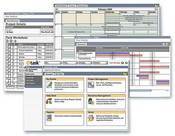Cloud, Unified Communications Improves Trade Show Logistics
Metropolitan Exposition is using hosted UC from Alteva and cloud services like Dropbox and Chatter to improve the coordination of trade show booth setup and logistics.


Top 15 Cloud Collaboration Apps
Slideshow: Top 15 Cloud Collaboration Apps (click image for larger view and for slideshow)
When the trade show must go on, Metropolitan Exposition is one of the companies that makes it happen, with unified communications and cloud collaboration services to grease the wheels.
"Ultimately, it's all about communications," CIO Larry Grossenbacher said in an interview. "Everything for us is relationship driven, so communications is huge." To smooth communications, he relies on cloud-hosted services including Alteva for voice over Internet protocol (VoIP) phone service and unified communications, Salesforce.com's Chatter, and the Dropbox file sharing service.
Metropolitan Exposition has about 100 employees, of whom approximately 70 are computer users. Grossenbacher said he got the CIO title because he knows just a little more about computers than everyone else in the company. He started out in college as a computer science major before veering into English literature, creative writing, and cinema, then wandered into the business of trade show logistics. Yet he never lost his interest in technology. As a CIO, he has been learning by doing.
Metropolitan Exposition is a New Jersey company founded in 2001 by three childhood friends, all of whom had been working for other show logistics companies. Its business is setting up booths and providing related services, such as audio visual setup. Customers are trade show organizers, as well as the exhibitors. The first contract Metropolitan Exposition won was for an event scheduled to open at the Jacob Javits Center in New York on September 11, 2001. Following that day's terrorist attacks, the first order of business was to tear down that show and hunker down to survive the interruption in business that followed.
"In the beginning, it was unbelievably rocky," Grossenbacher said.
The company persevered and began to grow rapidly. Within a year, it opened an office in Las Vegas and relocated its headquarters from Hoboken to Carlstadt. In 2005, Metro added an office in Edison and became the preferred contractor for the New Jersey Convention & Expo Center. In 2006, it relocated to a larger headquarters office in Moonachie. Because the company made finding inexpensive warehouse locations a priority, niceties like Internet connectivity were sometimes overlooked. At one point, the staff was dependent on a cellular phone network connection to the Internet that could only be used by one person at a time, Grossenbacher recalled.
[ Want to know more about Chatter? Read Salesforce.com Chatter Gets Smart. ]
Once Metropolitan Exposition had expanded into several locations, however, he went shopping for a better way to keep employees in all the locations connected. Grossenbacher said he initially considered Alteva as a provider for hosted VoIP phone service but instead picked Mindshift, which has a reputation as an all-in-one solution provider for mid-market firms. Mindshift provided a good turnkey service, but was "not as well versed" in VoIP as it was in managing email and other services, he said. When the contract came up for renewal, he went back to Alteva and signed up.
Alteva provides Metropolitan Exposition with a bundle of unified communications services built around Microsoft Office Communicator. Alteva Chief Sales Officer Louis Hayner said his company has not yet moved to Lync, Microsoft's latest update to its unified communications platform, because it doesn't work as well in a multi-tenant environment, meaning one where multiple customers are using the same server. "They decided to launch it to enterprise customers first, and make it multi-tenantable later," he said. Meanwhile, Alteva has a lot of experience using Office Communications Server as part of a hosted service and is sticking with that for now, he said.

11 iPad Apps For Better Collaboration
Slideshow: 11 iPad Apps For Better Collaboration (click image for larger view and for slideshow)
Grossenbacher said the unification of voice, video, presence, email, and other online services has proven effective for making the organization more efficient. "What we've found is that doing simple things can make a big difference," he said. For example, the office multifunction printer/copier/fax has the ability to convert faxes or print jobs to Adobe Acrobat PDF format and relay them by email to an Outlook folder the entire team can access, he said. Given the volume of floor plans and other documents flying around in the run-up to a show, that's pretty important, he said. "It means we're not printing out 60,000 pieces of paper."
Unified communications also means wasting less time trying to call someone who is not at their desk, and makes it easier to forward messages from a desk phone to a cell phone or other number. To improve after-hours coverage on the phones, evening calls to the New Jersey locations are forwarded to Las Vegas. People who don't work in the same office get to know each other better because video chats are now routine, he said.
Every user also gets an account on Microsoft LiveMeeting, which streamlines team and client communications. For example, trying to talk through changes to a floor plan over the phone can be awkward, he said. With screen sharing, "you can say booth 302 is a little too close to the column. See this booth, I need to move it up a little because the fire marshal says that's no good--boom, done," he said.
Salesforce.com's Chatter social network for business is also an increasingly important collaboration tool at Metropolitan Exposition. Whenever the company forms a team to support a new show, it also forms a Chatter group to track planning activities. While chat works well for impromptu online collaboration, Chatter is better for carrying on an ongoing conversation, where late additions to the team can go back through the discussion threads to see what's been decided so far, Grossenbacher said.
Alteva also allows him to pipe call records into Salesforce.com's customer relationship management system, he said. "We can run reports and see how many calls this person is making are actually in the database. That way, we know how many are some kind of lead and how many are not, and how many of the leads are qualified leads."
Metropolitan Exposition has not yet fully committed to Salesforce.com CRM, however. "I want to make sure it's worth the money," Grossenbacher said.
Another cloud collaboration service, Dropbox, became important after a valued employee moved away, and yet the company didn't want to lose him. Because he was once a draftsman who works on floor plans, which are large files, the Dropbox file sharing and synchronization tool allowed him to keep working for the company from his new home in North Carolina, while headquarters would still always have access to the latest versions of those files.
With a hosted phone system, Grossenbacher was also able to give that remote employee an extension on the company phone system--something he has also done with a couple of other home office employees in Philadelphia and Wisconsin. "They're one hundred percent integrated, just as if they were sitting right next to me," he said.
Attend Enterprise 2.0 Santa Clara, Nov. 14-17, 2011, and learn how to drive business value with collaboration, with an emphasis on how real customers are using social software to enable more productive workforces and to be more responsive and engaged with customers and business partners. Register today and save 30% off conference passes, or get a free expo pass with priority code CPHCES02. Find out more and register.
About the Author
You May Also Like






